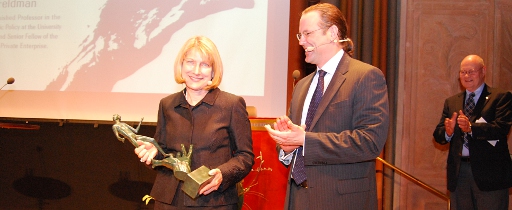Global Award: Fortune Favors the Prepared Region
On May 15 Maryann Feldman, Professor of Public Policy at the University of North Carolina, received the Global Award for Entrepreneurship Research 2013 an award ceremony held in Stockholm. The ceremony was followed by a prize lecture and a panel discussion on the topic of the lecture and the state of entrepreneurship and innovation policy in Sweden.
Pontus Braunerhjelm, Managing Director and Professor, Swedish Entrepreneurship Forum, started off by introducing the criteria for winning Global Award for Entrepreneurship Research.
– The Award should be given to “a person who has produced scientific work of outstanding quality and importance, thereby giving a significant contribution to theory-building concerning entrepreneurship and small business development, the role and importance of new firm formation and the role of SMEs in economic development.”
Melker Schörling, one of Sweden’s most prominent businessmen and chairman of several boards, including Melker Schörling AB and Swedish Entrepreneurship Forum, and the donor of the prize participated in the award ceremony.
– I became a donor of the prize because I think it is very important with serious research on entrepreneurs and what they mean for business and a country.
Göran Marklund, Director at VINNOVA, the sponsor of the prize, declared that he was glad to be participating in the prize for the first time and also stressed the importance of policy relevant research on entrepreneurship and small business.
Then Professor Bo Carlsson, chairman of the Prize Committee, shared the motivation for selecting Maryann Feldman:
– Prof. Feldman’s work spans over a wide spectrum of entrepreneurship research and she has made significant contributions to our understanding of areas of innovation, commercialization of academic research and factors promoting technological change and economic growth. Maryann Feldmans work is of high quality, encompassing an impressive output of conceptually sound, empirically thorough, and technically sophisticated papers in highly ranked journals, enjoying a high citation impact. Her work has also had significant policy impact.
Thereafter it was finally time for Maryann Feldman to receive the prize. Anders Borg, the Swedish Minister for Finance, handed her Carl Milles’ statuette ”The Hand of God” and a diploma stating the prize sum of 100 000 euros.
Fortune favors the prepared region
Maryann Feldman then held a prize lecture on the topic ”The Character of Place: Economic Development, Business Strategy and Prosperity”.
She began by telling us a Viking saga that took place in Greenwood Mississippi, a place that had an economical spark of entrepreneurship. There, Fred Carl, a fourth generation building contractor, decided to pursue the idea of creating the world’s first heavy duty, commercial-type range for the kitchen at home. He invested in Greenwood, not only in it’s industry but also in schools, hotels etc creating a destination. He also made sure that the universities had training programs that in the other end made sure that his industry would make good appliances.
– Every place wants to be Silicon Valley, except for Silicon Valley that wants to move forward. But can we really understand the relations that make Silicon Valley so great?
It is all about finding what makes a region unique, Maryann Feldman answered rhetorically. Large firm attraction is part of the toolkit complementing entrepreneurism. According to my own research breakaway firm phenomenon is also important for regional vitality. Mergers and acquisitions is often a way for new firms gaining entry into a region.
– Regional champions such as Fred Carl are building clusters while building firms. Such entrepreneurs are often in it for a longer term and are rather great than large. They also have respect for the region they live in and want it to be good. Fred Carl paid over average wages and cared about the place and how to bring it forward.
Maryann Feldman also told us about her 20 year debate with Professor Steven Klepper (Global Award winner 2011) regarding firm strategy and geography.
– I find that the fortune of firms and places are intrinsically tied. Geography is a way of organizing production. All processes are endogenous and firm strategy matters to places. Firms can decide to build external resources and actually make a place, what I believe is critically important.
Maryann Feldman concluded her lecture by emphasizing that fortune favors the prepared region.
– We never know where genius is to come from. Firms can relocate but governments cant. What government’s is about is to take the long term perspective. It is the only entity able to do so.
To sum up the Viking saga, she mentioned that it ended by Fred Carl selling his industry to a private equity firm that relocated the production to China.
– The story is not over, he showed what is possible for a person to accomplish: to create prosperity and high quality of life.
The partners behind the Global Award for Entrepreneurship Research are the founder, Swedish Entrepreneurship Forum (Entreprenörskapsforum), the co-founder, the Research Institute of Industrial Economics (IFN), the sponsor, VINNOVA, and the donor, Melker Schörling. The three organizations are jointly responsible for the Award.
A policy for entrepreneurship and innovation
The Minister for Finance, Anders Borg was invited to hand over the award and to give some comments on the state of Swedish entrepreneurship and innovation policy. Anders Borg pointed to the importance of these policy areas for the economy at large and suggested that just because Sweden is doing reasonably well there is still room for improvement. He stressed the need for an innovation friendly environment, where investments in R&D and the ability to adjust to new technology are important components. The government plays an important role in creating such an environment through a supportive infrastructure and improvements in education as well as efforts to strengthen supply and demand for labor. To achieve this, a country needs high social cohesion built on trust in the government. In international governance rankings, Sweden performs well and this contributes to a society of high trust.
– Trust and innovation are clearly linked. A society of trust allows for insecure ventures which are necessary for innovation. Sweden has that kind of high trust.
It is also important to strengthen the business climate. The government is directing its efforts towards a tax system that promotes growth, opening up markets for competition and to lower the costs of entry for entrepreneurs and businesses. Anders Borg also stressed the importance to maintain an innovative economy supportive of entrepreneurship rather than focus on specific support to certain types of companies or industries. Special regulations and support for certain sectors may lead to lock-in effects and barriers. The innovation friendly environment should allow new ways of solving old problems.
– Lots of entrepreneurs use new technology combined with old ideas.
The Minister for Finance also highlighted that tax money should be used for fundamental research, and increased access to VC is good but should have a supportive rather than primary role in financing. Moreover Anders Borg pushed for the importance of a well working infrastructure and pointed to the fact that if you have a good infrastructure a lot of other things work well too.
– If you don’t know what to do – build a road!
Trust important for innovation
The panel discussion was commenced with comments from Professor Philippe Aghion, Harvard Business School. He started out humbly, saying how he normally would recommend countries like his native France to take after Sweden, so what could he possibly recommend when talking about growth for Sweden. However, being an expert on Schumpeterian Growth Theory, Philippe Aghion, said that that innovation is a result of creative destruction and had a number of thoughts on the role of the government in order to facilitate this process. Deregulation, high turnover and some system that guarantee security for workers are necessary, Philippe Aghion argued. One component was highlighted above the rest.
– Trust is key! Deregulation and trust are connected. High regulation suggests low trust in society.
One exception that Philippe Aghion pointed out was green innovation. If a country worries about sustainability (as it should) there is a need to use targeted governmental efforts.
– If you have innovated dirty in the past, you will continue to innovate dirty in the future.
Nano – the next “game changer”
Maria Strömme, Professor in Nanotechnology at Uppsala University, spoke about Sweden’s standing in nano-entrepreneurship. Maria Strömme thought it beyond doubt that nano will be the next “game-changer” and as such affect all other sectors. Nanotechnology is a general purpose technology that will make things more efficient. In Sweden we have good ideas and are well positioned in terms of technology but we need to figure out a way to keep the business in Sweden. Maria Strömme pointed out the problem with VC investments in the nano sector. There is capital for the right ideas but there is a problem when success starts and the VC owner wants to sell.
– Swedish ideas mainly go to the US, Europe and China, very few stay in the country.
Maria Strömme sees a need for Sweden to keep its nano companies. She pointed to the fact that Norway is investing a lot more compared to Sweden in this sector even though Sweden has far better knowledge. Maria Strömme suggested an interesting partnership.
– My dream scenario would be a joint partnership between the Swedish and Norwegian nano-sectors. We need their money and they need our ideas.
Maryann Feldman, thought this idea was genius and a good example of how a region can form partnerships when building institutions. Anders Borg followed up on this saying that Sweden has strength in not being a protective country and through our openness and willingness to be part of the global we know we need to cooperate. He did not however, offer any concrete thoughts on the Norway –Sweden partnership idea.
Public procurement should set good example
Göran Marklund, Director Vinnova, talked about their important role in managing a part of the government innovation budget. They try to facilitate the connection between the entrepreneur and the capital. Public innovation procurement is also important from a normative point of view and to create demand for certain solutions. Vinnova’s investment strategy and regulations matter for the development of capital.
– What we buy matters. If we want sustainability it matters how we procure and facilitate these alternatives
Göran Marklund, thought this kind of system perspective is lacking today and wanted to see more of that in the future.
Philippe Aghion agreed. The notion of sustainability has to be kept in mind when discussing growth he thought.
– How can societies grow in an equality focused way? Philippe Aghion asked.

Anders Borg, Maryann Feldman, Maria Strömme, Philippe Aghion, Göran Marklund and Pontus Braunerhjelm
Anders Borg suggested that the government can contribute in areas where regular banks don’t work well or want to invest, for example in rural areas. Also, the Swedish banking sector is too small to finance exports and there the government has a role to play.
– Any kind of economic growth must be built on social cohesion, Anders Borg said.
According to Anders Borg this will be based on politics focusing on building growth and trust through increasingly open sectors, continuous reforms, the rule of law. All based on a strong democracy.
Lastly, Marianne Feldman was asked about suggestions for Anders Borg. She thought public spending works prejudicing.
– The state should lead the way. Firms do not mind high taxes if they get good benefits in return.





